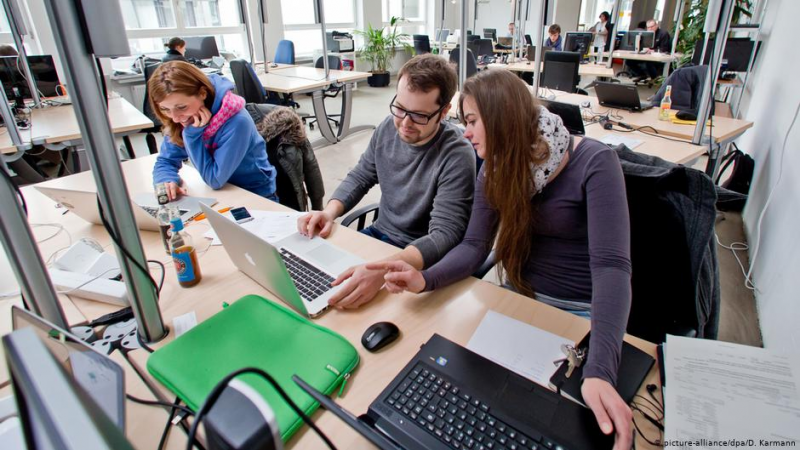It is commonly believed that it is difficult for people with a humanitarian mindset to prove themselves in the IT field. Often employers immediately indicate that the candidate must have a technical "crust. But whether it is so obligatory to finish the profile high school, to "enter IT"? We talked to experts in humanities who succeeded.

Olga Rubtsova, tester:
My name is Olga. By education I am a journalist, but most of my journalistic career I worked in advertising, also was the editor of a glossy provincial magazine in my native city of Tomsk. During the crisis in 2008, when the decline in advertising and periodicals was too strong, I faced the question: either to leave for a bigger city, or change the field. Then I was offered a job in advertising in one company, but because of the specific management I had to escape from there rather quickly.
The very next day I received a job offer as a content manager and internet marketer for a betting company. I knew nothing about internet marketing at the time, I learned everything on the fly. The situation was further complicated by the fact that there wasn't much useful information: I translated some from English and found some in Russian. I even had a special book on Google Analytics (at that time Google itself produced them). Gradually there was more and more information, but my cooperation with the company came to an end. I did not want to continue working as an Internet marketer - the market was flooded with cheap offers from various web-studios, it was difficult to compete, and there was no point.
At that time it was not so easy to find a place for a humanitarian in IT - separate roles of a technical writer, an analyst, a tester (and this, in fact, was what I could do) were not yet allocated, at least in the province, project managers were only just appearing among the offers. Actually, I was hired for my next job precisely because I could do all these roles, although technically I was a tester. I also studied testing on the fly, reading everything I could get my hands on.
It was in my role as a tester that I began to develop, learning the technicalities, SQL, REST, etc. To improve my skills I attended courses and went to IT conferences. Now I try to independently maintain its knowledge base, but I am thinking about taking an automation course, I would like to move to a new level in testing. I like the fact, that for testing, this role combines many things - the necessity to understand the business processes of the subject area, technical knowledge, the ability to set correct questions, and a variety of tasks. I probably would not get all that in journalism.

Marina Faichuk, administrator of cross-functional processes at ICL Services:
I was graduating from Voronezh State University with a degree in translation and translation studies in 2009 and was wondering where I should go to work after graduation. At that time a local IT-company came to our university and required people for a new project with knowledge of German to do light work with applications. I had studied English and French, but I sent my resume to the contact email anyway. After a while the company had English-speaking customers, I was invited for an interview, I passed it and began to work in parallel with my studies. Thus began my history in IT.
In my first job I had worked for 7 years, before I came to ICL Services. There, I went a long way from just hanging requests to the right groups, on call 24/7 Service Desk duty, to the rather challenging work of supporting customer contracts, managing SAP, and coordinating business operations. At ICL Services I began studying ITIL and became happy to work in a process team as a coordinator of changes in the customer's infrastructure.

Alexey Kovalenko, Deputy General Director of Goodman:
One head is good, but two educations is better. My parents said: "Go to Polytechnic, engineer - bolts, microcircuits and no headache, and a veterinarian - dirt, stink and responsibility". But at 16 my parents are no authority. As a result, I entered and graduated from an agricultural school as a veterinarian-zoo-engineer. Engineer... but in fact, a veterinarian with advanced training. You've probably heard the joke about crossing a hedgehog with a boa constrictor. A zooengineer knows that you can't cross a hedgehog with a boa constrictor, but you can cross a horse with a donkey - you get a mule. Such an engineering education. Life dotted the i's and crossed the t's. In 1995 I got to know my personal computer and became interested in it. In my third year of college I built my first computer out of spare parts. To play with my friends I assembled two more computers and built local network. By graduation, I got a job at an IT company as an engineer, where I maintained information databases, communicated with the administrators, solved technical problems on client computers. Next is more, the clients liked my technical literacy and, what is important, my humanities education, the management noticed and appointed me as a head of department. Then I finished my MBA and became the Director of Development in the Russian IT-holding, where I have successfully realized the project in the governmental organizations.
Working in the holding company with governmental institutions is tiring - a clear mind and creativity make it easy to implement the knowledge from one area into another. Small businesses are happy to absorb the work methods and technologies of market sharks. I now work as deputy general manager at Goodman, a family-owned company that makes cosmetics for pets. For CRM, virtual PBX, cloud workspaces, and unified information space are not an empty sound, but monetized knowledge on the company's account and annual growth in profits and organization.

 Русский
Русский





